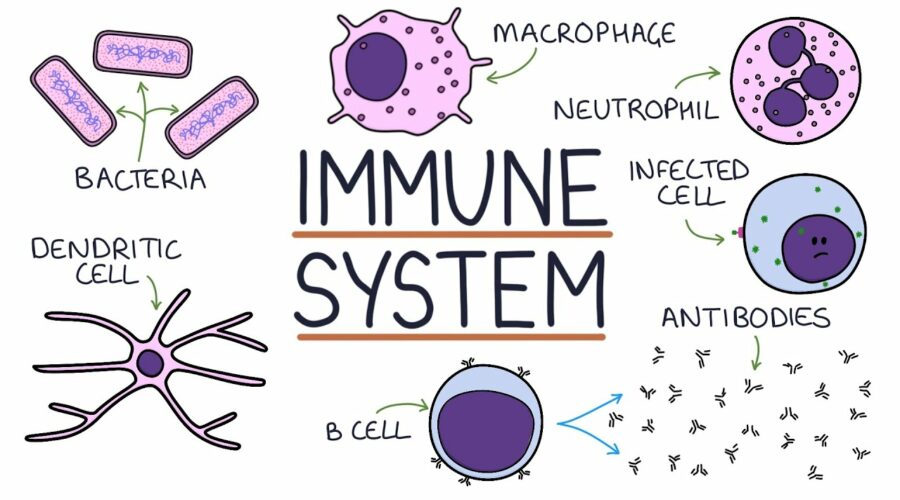The immune system is a complex network of organs, cells, and proteins that defend the body against infection while protecting the body’s own cells. It is made up of two main parts: the innate immune system and the adaptive immune system.
The innate immune system is the body’s first line of defense against infection. It is made up of cells that are always present in the body, such as white blood cells, natural killer cells, and phagocytes. These cells work together to identify and destroy foreign invaders, such as bacteria, viruses, and parasites.
The adaptive immune system is the body’s second line of defense against infection. It is made up of cells that are specifically designed to fight off particular invaders. These cells are called B cells and T cells. B cells produce antibodies, which are proteins that bind to specific antigens on foreign invaders. T cells attack and kill infected cells.
The immune system is constantly learning and adapting. When it encounters a new invader, it creates a memory of that invader so that it can respond more quickly and effectively if the invader is encountered again. This is why people who have been infected with a virus, such as chickenpox, are usually immune to that virus for life.
The immune system can be affected by a number of factors, including diet, stress, and medication. A healthy diet that is rich in fruits, vegetables, and whole grains can help to support a healthy immune system. Stress can weaken the immune system, so it is important to find ways to manage stress, such as exercise, relaxation techniques, and spending time in nature. Some medications, such as steroids, can also suppress the immune system.
There are a number of things that you can do to keep your immune system healthy, including:
- Get enough sleep.
- Eat a healthy diet.
- Exercise regularly.
- Manage stress.
- Get vaccinated against common diseases.
- Avoid smoking and excessive alcohol consumption.
- Wash your hands frequently.
- Stay home when you are sick.
By following these tips, you can help to keep your immune system strong and healthy and protect yourself from infection.
Here is a more detailed look at the different parts of the immune system:
- Innate immune system: The innate immune system is the body’s first line of defense against infection. It is made up of cells that are always present in the body, such as white blood cells, natural killer cells, and phagocytes. These cells work together to identify and destroy foreign invaders, such as bacteria, viruses, and parasites.
- White blood cells: White blood cells are the main cells of the innate immune system. There are two main types of white blood cells: phagocytes and lymphocytes. Phagocytes engulf and destroy foreign invaders. Lymphocytes produce antibodies, which are proteins that bind to specific antigens on foreign invaders.
- Natural killer cells: Natural killer cells are a type of lymphocyte that attack and kill infected cells. They do not need to be specifically activated to do this, which makes them an important part of the body’s first line of defense against infection.
- Phagocytes: Phagocytes are white blood cells that engulf and destroy foreign invaders. They are the body’s main defense against bacteria. There are two main types of phagocytes: neutrophils and macrophages. Neutrophils are the most abundant type of phagocyte in the blood. They are short-lived cells that are quickly produced in response to infection. Macrophages are larger and longer-lived than neutrophils. They are found in tissues throughout the body, where they constantly patrol for foreign invaders.
- Adaptive immune system: The adaptive immune system is the body’s second line of defense against infection. It is made up of cells that are specifically designed to fight off particular invaders. These cells are called B cells and T cells.
- B cells: B cells produce antibodies, which are proteins that bind to specific antigens on foreign invaders. Antibodies mark the foreign invaders for destruction by other cells of the immune system.
- T cells: T cells attack and kill infected cells. There are two main types of T cells: helper T cells and killer T cells. Helper T cells activate B cells and other cells of the immune system. Killer T cells directly attack and kill infected cells.
The immune system is a complex and constantly evolving system. It is essential for our survival, and it is important to take steps to keep it healthy. By following the tips above, you can help to keep your immune system strong and protect yourself from infection.





